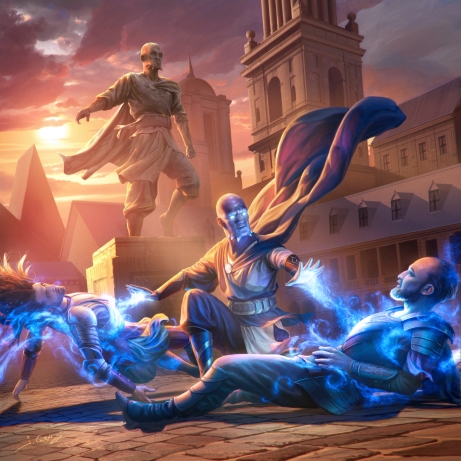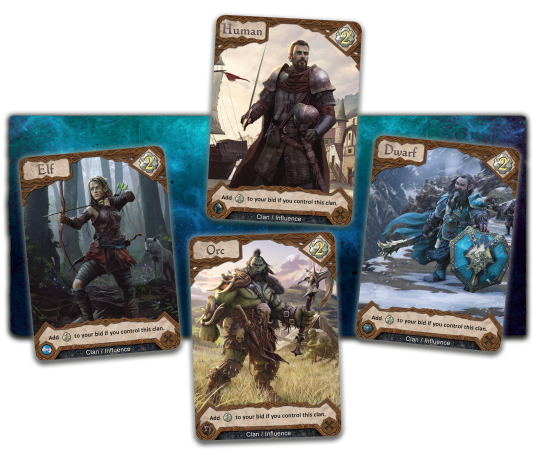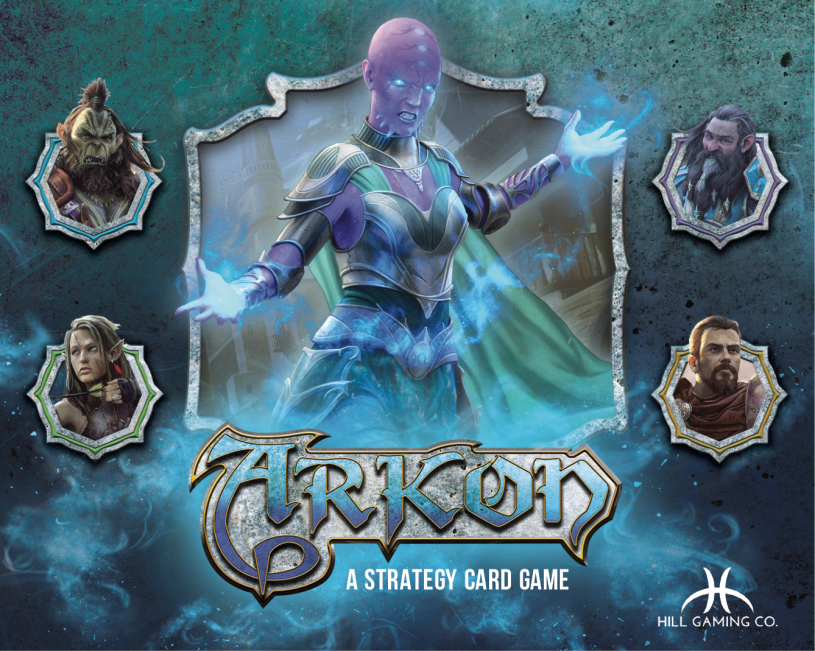Tell us a bit about yourself and Arkon.
My name is Casey and I am the founder of Hill Gaming Company. Our first product is Arkon. Since I was young I have had a deep passion for the high fantasy genre and for gaming. It was a dream to bring those together into a product that was strategic and rich in lore. The company was started as a family joint-venture with my dad and brother as part of the team. My dad ran a successful company for decades and my brother is a professional Magic the Gathering player so both had an incredible impact in helping on this journey and shaping the game.
Arkon itself is a fast paced, non-linear strategy card game that revolves around two central mechanics: bidding and multi-use cards. What the heck is non-linear you might be asking yourself? We coined the term to describe the unique pacing in Arkon, that unlike conventional games where you accumulate more resources, engine, monsters etc. and snowball into victory, Arkon is more of a handbuilding game, with your ability to stabilize and be back in the action always on the table. Arkon is also highly interactive, as players are drawing on all turns and are bidding on all turns (if they choose to) which makes for very little down-time!
What did you do to build up a following before you launched Arkon?
We did a handful of things.
One thing is to do playtests at local gaming stores and have a sign-up sheet where you collect names and emails.
Another thing is to send the game out to as many review channels as you possibly can. We did about ~12 and each of those has an audience that they speak to.
We also ran Facebook ads, specifically geared towards our Day 1 launch event and so we got a little buzz that way.
We developed relationships with people in the industry. There is a lot of incredible publishers and community members and we were very active in Facebook groups and on twitter, just engaging with people around stuff we were passionate about (and supporting other publisher’s games and endeavours. There is so many amazing games!)
When did you launch and why did you choose that exact moment?
We launched on Feb. 1st, 2018 and there was no exact science to this. We reached a point were the game was essentially done and we were just in community building/marketing mode. So we gave ourselves roughly 4-5 months to get as much traction as we could and then went live.
You have a rather low funding goal. How did you end up with that?
We feel that a lot of people kind of pick a number out of a hat when it comes to a funding goal. For us, we wanted to be very calculated about this. My initial hope was 10k and talking with our team we agreed we wanted substantial Day 1 commitment towards the goal. We determined that we would create a facebook event and if we hit 300 attendees on that event we would go live at a goal of 10k (and we would discount interested votes as my marketing contacts told me they convert typically around 10%, something that proved to be fairly close to accurate after we launched). I thought our event did pretty darn well, but we got 150 people as attendees and around 350 interested so we cut the goal in half to match that. Another thing was just the minimum amount we would need to raise to actually produce the game. That number for us was $5k (although it would of been not even remotely close to covering our costs).

On your web page you have several cool stats over the development. Why do you have that and did you receive any feedback from backers over your transparency?
The candid answer is no, we did not receive any feedback, but it was still very important to do. We spent a lot of time and ran a lot of playtests going into building this game. I believe that trust is really important and when you have so many choices as a consumer, I think people knowing (and seeing through reviewers etc.) that the game is thoroughly tested, is critical. It was also fun to keep track internally, updating tiles as we allocated more hours and ran more tests.
If there was one thing you wish you knew before you launched Arkon, what would it be?
Custom Referral Tags! So when we launched we were running advertisements on facebook, twitter and reddit. We were getting great impressions and click throughs on all three. But we realized after about Day 3 we had no way to see the conversions (the default tracking in Kickstarter we found to be quite off). When we added custom referral tags though and plugged them in we then could see exactly how everything was performing and realized FB was the most optimized way to connect with people. Custom Referral tags is a feature in your Kickstarter dash and it just generates custom tracked links so you can see conversions.
What´s your main tactic to handle the mid-campaign drop in new backers?
Our plan is just to get out and connect with people as much as possible. We want to do game nights, we want to do interviews, we want to connect with people on social media, do live streams etc. So no one tactic but more of a lot of small things and hope some of those stick.
What is your best marketing tip during a campaign?
This one I have to give a shout-out to James Hudson of Druid City Games because he had a hugely impactful tip. I was running these paragraph long ads that explained what Arkon was and why it was unique etc. etc. He told me, “Casey, just say this, “Arkon is on kickstarter! It funded in 3 hours! Only $20” and have a picture of the cards. Our click throughs and ads overnight performed 5 to 6 times better. That was a really impactful lesson. You have a second of the prospects attention, keep the tag-lines short and relevant.

How do you structure your days during the campaign?
I work a full time job so I do 10 hour days at work and then get home to work on Arkon. I have help from some other team members but typically 6-11 PM I am working hard on answering questions, doing outreach and coordinating our internal teams (for things like new art development for Stretch Goals).
What’s the best kickstarter advice you ever received?
Just be authentic. It sounds kind of cliche, but just be open with your backers. They know you are not perfect. They know there will be hiccups. Send them frequent updates, appreciate them, thank people. Even if your game is the bee knees, they are taking a gamble on you if you are a new publisher. Let them know you will move heaven and earth to make sure you exceed their expectations.
Also, be unceasingly positive. You will get harsh feedback and you will get trolls that just want to say mean things. For feedback, even if it’s negative, if it’s constructive, always listen. If people are just bashing you or your game, either don’t engage or just say something kind. Never get into a war with some rando on a forum, it’s not worth your emotional energy and it creates a negative aura around your product.
What´s your thoughts regarding stretch goals?
I love to reward my backers for helping me reach new heights with the game. That being said, in our case and with our minimum order size, we are probably going to take a solid margin hit with several of ours. That is okay. This first game is not about making money. Our first game is about publishing something that is beautiful, engaging and gets people excited. I think about the long-term. If we produce something people love, they will come back.
What is your comment in the debate about paid vs unpayed reviews?
I actually think there is a lot of misinformation out there. Granted, my knowledge might be limited here, but I know of very few paid review channels. Most of the paid channels, like the ones we used with Undead Viking or Tantrum House are doing actual walk-throughs and game descriptions of the game. To me if you pay someone to say your game is great, that is disingenuous. If you pay someone to do a play-through of your game and explain the rules in a nice studio with good lighting etc. I think that’s great and we did that. We also did 10 free reviews where we just sent the game out and had people give us their thoughts.
On another note, reviewers deserve to be paid. These are amazing creatives who are taking time out of their day to help get your game exposure. Almost all do it as a hobby, so as a plug, donate to the channels that produce content you consume, it will mean a lot to them!
What do you think is the most important element of a Kickstarter page?
I think this varies by person, but I love a good video. For me, the video is what either excites and hooks me, or not, and then I scroll down the page and start looking at everything else.
Do you have any role models in the board gaming industry?
O man, there is so many amazing people who have helped me. Jamey Stegmaier is the king of kickstarter in my opinion and if you aren’t reading his blog you are messing up. James Hudson and Derek Funkhouser of Druid City Games have given me lots of great advice. Artem Safarov, who is coming out with a new game Unbroken, in March, has been amazingly generous with his time and helping me. Tristan Hall, who has successfully run Gloom of Kilforth and 1066, Tears to many mothers, is another great role model in the gaming industry. I am sure I am missing a ton of people. The gaming community is awesome.
Anything else you want to add?
If you want to launch a kickstarter, know that it will be hard. You will feel deflated and want to quit after you run your first playtest at a store and people say, “meh”. But if you love gaming, and this is your dream, stick with it. Listen to the playtesters. Change the game, keep iterating. Try again. And I promise you, when you do your last series of playtests a year later and you knock it out of the park, game after game, that will be the best feeling in the world.
Where can people reach you?
Most importantly, our kickstarter page: https://www.kickstarter.com/projects/1080559033/arkon?ref=dw8i8k
We also have a website: Arkongame.com
And you can find us on social media @arkongame on Facebook, Twitter and Instagram.
Email us at admin@arkongame.com
